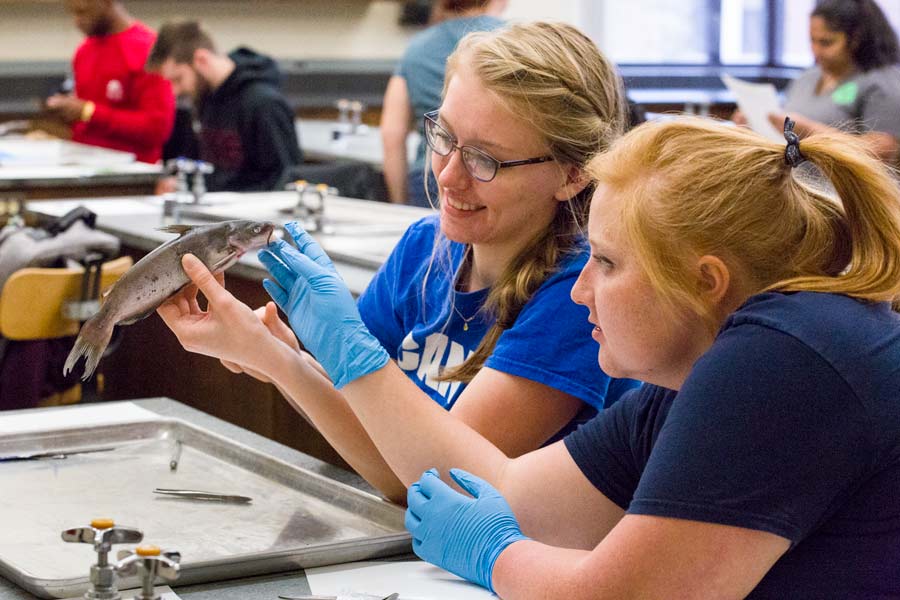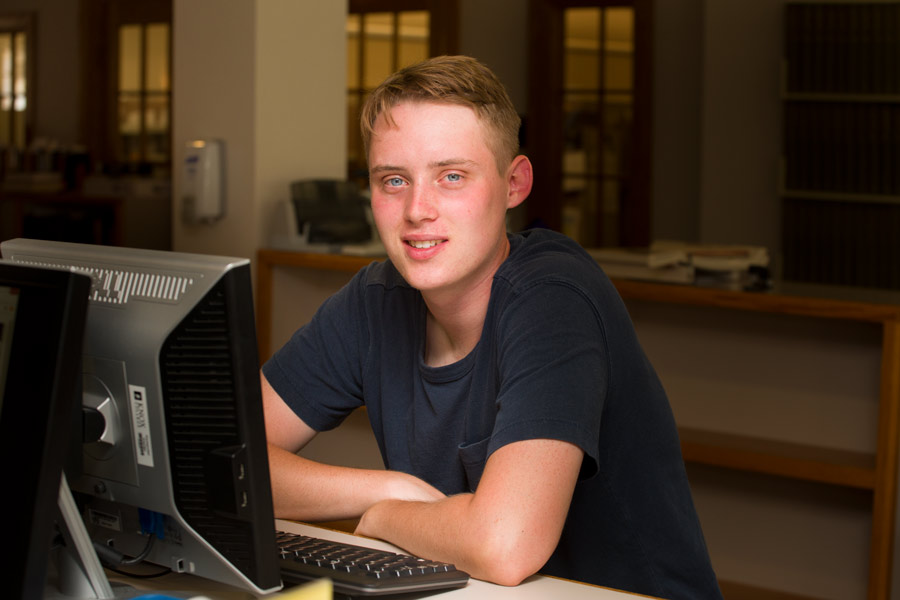When Lily Ibarra '01 first arrived at Knox College to begin her undergraduate studies in 1997, the notion of going to graduate school someday hadn't entered her mind. As a Chicago native, the daughter of Mexican immigrants, and the first to leave home for college, "I was simply eager to survive my day-to-day reality at school," she recently recalled.
That changed during her sophomore year, when she was accepted into the Ronald E. McNair Postbaccalaureate Achievement Program, known more informally as the McNair Scholars Program. Now a tenured associate professor of Spanish at Dominican University, Ibarra gives much of the credit to the McNair Program at Knox. "I am certain that I would not have come to this point if I had not had McNair as part of my undergraduate experience," she said. "McNair was more than an opportunity, it was a life-changing experience. The two most crucial values that I gained from this journey are equity of educational opportunity and mentorship."
The federally funded McNair Program awards grants to institutions of higher learning "for projects designed to provide disadvantaged college students with effective preparation for doctoral study," according to the United States Department of Education website. The program is named after Ronald E. McNair, one of the astronauts who died in 1986 when the Challenger space shuttle exploded.
“
The two most crucial values that I gained from this journey are equity of educational opportunity and mentorship.
Lily Ibarra '01
The overarching goal is to "diversify the academy" to include more people from underrepresented groups, said Jon Crider, director of the McNair Program at Knox. "We provide research and other scholarly activities that prepare students for obtaining a Ph.D."
The experience for Knox's McNair Scholars is multi-faceted, and it includes:
- Designing and conducting research projects, with assistance from faculty mentors.
- Presenting research at national conferences.
- Having work published in the McNair Journal of Multidisciplinary Research.
- Engaging in seminars that offer enriched academic preparation, development of research skills, and familiarization with the process of applying to and preparing for graduate school.
Knox received its first grant for the McNair Program in 1992, and the federal government awarded Knox another five-year renewal in September 2017. As of last year, there have been 233 McNair Scholars at Knox. Twenty-two of them have received Ph.D.s, 101 have earned master's degrees, and 19 have obtained professional degrees, such as in law, medicine, or dentistry. About 10 new McNair Scholars are added each year at Knox.
"We've been very successful. We've been very proud," Crider said.
Monica Prince '12, now the Creative Writing Fellow in Poetry at Susquehanna University, said the McNair Program "gave me more than I expected." She learned about research methods, presentation skills, and graduate school. She made good friends. And that's not all.
Going through the program "helped me learn time management, how to be self-determined in a space that will not give you deadlines. I had to create goals for myself, make sure I was always on task, and that I didn't falter when my life got in the way." Prince said. "Following Knox, I know that my work with McNair overprepared me for graduate school. My first year, I watched my peers drown in homework and personal writing, while I wrote and read and flew through my courses."
“
Following Knox, I know that my work with McNair overprepared me for graduate school. My first year, I watched my peers drown in homework and personal writing, while I wrote and read and flew through my courses.
Monica Prince '12
During Homecoming festivities last year, Prince and other Knox alumni returned to campus to mark the McNair Program's 25th year and to talk about how it had influenced their lives. Ibarra described the importance of working with a faculty mentor—in her case, it was Magali Roy-Féquière, associate professor of Gender and Women's Studies.
Ibarra's research during two summers explored "the intersection of language and gender of identity in the autobiographies of Chicana women." Through the project and by building a relationship with her faculty mentor, Ibarra said she developed skills in academic writing and inquiry. More importantly, she added, "I discovered a vocabulary and experience that reflected my own and empowered me, like [writer Cherrie] Moraga, to begin to question, push and blur the boundaries of convention in my scholarship and later in my profession. In so doing, I have gained liberty of expression and given greater visibility to a complex and underrepresented identity."
Maricruz Osorio '14 also spoke at the Homecoming event and said the McNair program at Knox helped her get where she is today—in the second year of a doctoral program in political science at the University of California Riverside. She is co-author of the article, "Courted and Deported: The Salience of Immigration Issues and Avoidance of Police, Health Care, and Education Services among Latinos," which appeared in the fall 2017 edition of Aztlan: A Journal of Chicano Studies.
"It's not just that McNair gives you support within Knox," said Osorio, who plans on a career in research. "It's a fellowship across the country. I go to conferences all the time, and when I meet another McNair, it's an instant connection."
Crider said that Knox's McNair Program has numerous strengths, one being the fact that the scholars participate for three years. At other schools, McNair typically is designed as a one- or two-year program.
"We're unique in that we do three years, and I think that gives our students an advantage, in that they get to do two [summer research] projects. so they get even more research experience," Crider said. "We also give them more opportunities. We actually help pay for them to do graduate school visits, so they can go and visit a graduate school of their choice to see what that's like, do a tour, and meet with faculty."

Another strength is the collaborative relationship among McNair scholars, Knox staff (such as Seymour Library's research librarians), and Knox faculty, including the mentors as well as McNair Seminar Director William Hope, assistant professor of anthropology-sociology. In addition, Crider said, "The thing we really work on is creating a community where these students can talk with each other and support each other because they're all going through very similar things. Many of our scholars wind up making really good friends with their fellow scholars."
“
The thing we really work on is creating a community where these students can talk with each other and support each other because they’re all going through very similar things.
Jon Crider, Director of the McNair Program
Not everyone who goes through the McNair Program ends up pursuing postgraduate studies. Even so, many of the skills they develop as McNair Scholars are transferable to other aspects of their after-Knox lives. "They gain a lot of skills and confidence in being able to write, being able to research," Crider said. "Yes, the goal of the McNair Program is to create Ph.D.s, but really for us, the goal is to create opportunities for students to become academics, to truly become scholars."
The current McNair Scholars at Knox continue to excel and make great strides as they work toward their goal of attending graduate school. Consider the achievements, so far, of just three of them:
Chemistry major Malik Hamilton '19, a member of the Prairie Fire football and track & field teams, has conducted research inspired by the work of his faculty mentor, Professor of Chemistry Thomas Clayton.
"The main goal of the project is to create good liquid crystals around room temperature," Hamilton said. "I'm really interested in becoming a chemist or professor. To get ahead in those fields, summer research helps."
Natalie Haddad '19 has been researching the medicinal plant bloodroot as a possible treatment for cancer in dogs. She credits faculty mentor and Professor of Biology Judy Thorn with helping her gain experiences in laboratory research and hands-on clinical work through an internship with a Galesburg veterinarian. A biology major, she is considering attending veterinary school and/or earning a doctorate in animal sciences.

"All I know is that I want to work with animals and help them in any way that I can," Haddad said. "This research is basically allowing me to see what it'd be like to go into this field before I'm even done with undergrad, which is not something many people get to do."
Justin Bell '19, a psychology major, conducted research on how feelings of social isolation relate to drug cravings.
"My ultimate goal, and one of my reasons for joining McNair, is to attend graduate school. I'm really looking forward to having a 'Dr.' in front of my name," Bell said. "I'd like to pursue a lifelong career in research and wherever that takes me."